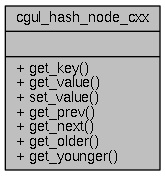C++ bindings for cgul_hash_node
More...
#include <cgul_hash_node_cxx.h>

Public Member Functions | |
| const void * | get_key () const |
| void * | get_value () const |
| void | set_value (const void *value) |
| cgul_hash_node_cxx * | get_prev () const |
| cgul_hash_node_cxx * | get_next () const |
| cgul_hash_node_cxx * | get_older () const |
| cgul_hash_node_cxx * | get_younger () const |
Friends | |
| class | cgul_hash_cxx |
Detailed Description
This class provides the C++ bindings for C cgul_hash_node objects. The main purpose of this class is to convert the C-style function calls and exception handling in cgul_hash_node into C++-style function calls and exception handling. This class must not be extended.
Member Function Documentation
§ get_key()
|
inline |
§ get_value()
|
inline |
§ set_value()
|
inline |
§ get_prev()
|
inline |
Get the previous node in insertion order. This method is a synonym for get_older(). You can use this method to iterate over the hash in reverse insertion order. When there are no more nodes, NULL is returned. You can use cgul_hash::get_back() to get the last node in a hash in order to start iterating.
- Returns
- previous node
- See also
- get_older()
References cgul_hash_node__get_prev().
§ get_next()
|
inline |
Get the next node in insertion order. This method is a synonym for get_younger(). You can use this method to iterate over the hash in insertion order. When there are no more nodes, NULL is returned. You can use cgul_hash::get_front() to get the first node in a cgul_hash in order to start iterating.
- Returns
- previous node
- See also
- get_younger()
References cgul_hash_node__get_next().
§ get_older()
|
inline |
Return the next older node. Together with get_younger(), this method lets you traverse the hash in chronological order. If there is no older node, this method returns NULL.
The following example shows how to iterate over the entire hash in reverse chronological order. Notice that you have to start with the youngest node when calling get_older():
cgul_hash_node_cxx* n = h->get_youngest();
for ( ; n ; n = n->get_older()) {
...
}
- Returns
- older node
References cgul_hash_node__get_older().
§ get_younger()
|
inline |
Return the next younger node. Together with get_older(), this method lets you traverse the hash in chronological order. If there is no younger node, this method returns NULL.
The following example shows how to iterate over the entire hash in chronological order. Notice that you have to start with the oldest node when calling get_younger():
cgul_hash_node_cxx* n = h->get_oldest();
for ( ; n ; n = n->get_younger()) {
...
}
- Returns
- younger node
References cgul_hash_node__get_younger().
Friends And Related Function Documentation
§ cgul_hash_cxx
|
friend |
The documentation for this class was generated from the following file:
